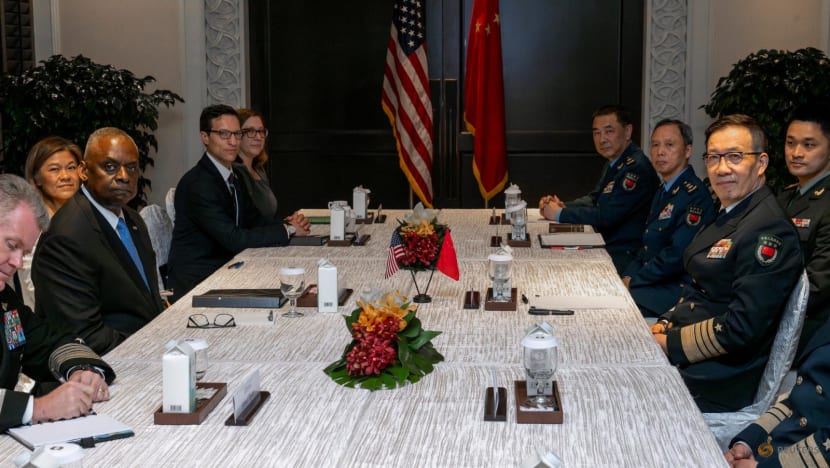Commentary: 'Red lines' at Shangri-La Dialogue a reminder of need for new solutions to old problems
From US and China defence chiefs holding rare direct talks and a surprise visit from Ukraine President Volodymyr Zelenskyy, Singapore hosted an important forum for communication in an era of complex geopolitics, say Nanyang Technological University’s Sarah Teo and Dylan MH Loh.


This audio is generated by an AI tool.
SINGAPORE: Global attention was on Singapore over the weekend at the Shangri-La Dialogue, with two events generating the most buzz: United States and China defence chiefs held face-to-face talks for the first time in 18 months and Ukraine President Volodymyr Zelenskyy made a surprise in-person visit to the annual security forum to call for support to end Russia’s invasion.
In an era of complex geopolitics, such a forum opens an important space for communication - both in what organisers line up in the official programme and how countries choose to engage on the sidelines.
An important function of dialogue - especially among contending parties - is to ensure that each side understands the other’s “red lines”. In this regard, the Shangri-La Dialogue certainly provided that.
US-CHINA TIES
The meeting between US Secretary of Defense Lloyd Austin and Chinese Minister of National Defense Admiral Dong Jun is significant as it is the first time that they have met in person, following a video call in April. In the context of the heightened tensions between Washington and Beijing, such face-to-face communication is important to facilitate more substantive interactions and reduce military risks.
Indeed, the resumption of military-to-military dialogue between the two countries - particularly the creation of a “crisis-communications working group” by the year’s end - is encouraging, even if it is evident that fundamental differences persist.
Two days after the bilateral, while addressing the conference, Admiral Dong was unequivocal on how Taiwan was the “core of core issues” for China, discoursing at length in his speech and in his responses to questions. At the same time, he stressed that the United States is testing China’s “red lines” with arms sales to the island.
While these speeches often carry a performative element, they are nonetheless important in setting the baseline on what is unacceptable behaviour - which, in theory, would lessen the risk of miscalculation and inject predictability.
CNA Correspondent podcast:
RED LINE IN SOUTH CHINA SEA?
Earlier in the conference, Philippine President Ferdinand Marcos Jr declared it would “almost certainly” be a red line if a Filipino is “killed by a wilful act” in the South China Sea, and “very, very close to … an act of war”. He was responding to a hypothetical question posed about the use of water cannons by China’s coast guard against Philippine ships in disputed waters, where the two countries have had numerous run-ins.
In reality, however, the establishment of red lines can themselves be a point of contention because the other party may not accept or acknowledge their legitimacy. It was reported, for instance, that China briefed the media after Mr Marcos’s speech to push back against his claims. In the case of Taiwan, the United States believes arms sales are legitimate under its Taiwan Relations Act of 1979 and has continued to do so under successive presidents, even though China has repeatedly protested against them.
The value and the risk of drawing red lines have to be weighed, lest countries back themselves into escalation.
And that is why it is incumbent on all countries, if they cannot resolve issues, to properly manage them. Indeed, discussions at the Shangri-La Dialogue repeatedly stressed the expectation of responsible behaviour.
RESPONSIBILITY OF ALL
Both major powers and smaller states have responsibilities towards maintaining the rules-based international order. Indonesia Minister of Defence and President-elect Prabowo Subianto emphasised that great power status demanded commensurate responsibilities, while Lithuania Prime Minister Ingrida Simonyte spoke about the agency of small states to “achieve strength through unity”.
But some challenges remain intractable. A peaceful and just end to the wars in Ukraine and Gaza remains distant even as they must be pursued relentlessly.
So there must be a responsibility for all to also re-imagine solutions for peace and stability - the theme of the plenary session in which Mr Zelenskyy spoke - and a need for more countries to stand up and be counted in efforts against unilateral attempts to change the global and regional status quo.
To many, a Ukraine peace summit or the call for inclusive dialogue may sound like more of the same - hardly a re-imagining of solutions.
But there would be some room for countries to explore new approaches within the broad contours of such initiatives, such as alternative formats of cooperation that would circumvent existing political hurdles.
What would be reassuring to countries in the region - and to Southeast Asia in particular - is that many of the speeches touched on the notion of “ASEAN centrality” and how the Association of Southeast Asian Nations (ASEAN) must remain a key component of the regional security architecture. The grouping has caught some flak recently for its perceived ineffectiveness in responding to regional challenges.
Though there was a sense that regional stakeholders broadly agreed that ASEAN is a constructive albeit limited actor, member states can afford a rethink of its approach and shape what ASEAN centrality actually means. What it cannot afford is to take a backseat and lose its relevance as a partner.
Successful solutions to the unfolding challenges are likely to be few and far between in the near term. But for the sake of durable peace and stability, it is imperative to keep trying.
Sarah Teo is an assistant professor in the Regional Security Architecture Programme, Institute of Defence and Strategic Studies (IDSS), S Rajaratnam School of International Studies (RSIS), Nanyang Technological University (NTU), Singapore. Dylan MH Loh is an assistant professor at the Public Policy and Global Affairs programme, also at NTU.



















